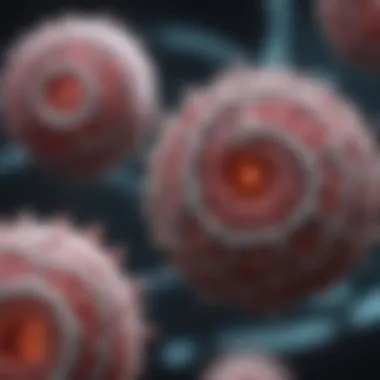SC Genotype Treatment: Advances and Ethical Implications


Intro
The exploration of SC genotype treatment is pushing boundaries in the field of genetic research. As technology advances, researchers are better equipped to tackle the complexities associated with these genetic variants. This article delves into the methodologies, applications, and ethical implications surrounding SC genotype treatment. It is vital for students, researchers, and healthcare professionals to stay updated as these technologies evolve.
Research Overview
Summary of Key Findings
Recent studies have illuminated several areas regarding SC genotype treatment. The genetic mechanisms underlying SC genotypes can influence treatment efficacy and patient outcomes. Insights from numerous clinical trials indicate that precision medicine approaches tailored to specific genetic markers show promise in improving therapeutic strategies. Key findings in various studies reveal that drugs targeting particular SC genotypes can lead to better management of associated health conditions.
- Advances in gene editing technologies, such as CRISPR, are proving to be significant in SC genotype treatment.
- Many researchers are focusing on understanding the role of epigenetics in expression of SC genotypes.
- Ethical considerations remain paramount. Balancing innovation with responsibility is an ongoing challenge in this field.
Relevance to Current Scientific Discussions
The discussion around SC genotypes ties in closely with broader conversations in genetics and bioethics. Researchers are increasingly recognizing the importance of diverse perspectives when addressing potential risks and benefits of these treatments. Engaging with ethical dimensions fosters a more responsible approach to genetic research, addressing concerns about equity, access, and long-term consequences of genetic interventions. These discussions are crucial as society grapples with the implications of genetic manipulation.
Methodology
Research Design and Approach
The methodologies employed in researching SC genotype treatments vary widely. Most studies adopt a combination of experimental designs, including clinical trials and observational studies. The design chosen often reflects the specific objectives of the research.
- Clinical Trials: Rigorously test the efficacy of treatments in controlled environments.
- Observational Studies: Examine real-world applications and outcomes of SC genotype treatments in diverse populations.
Data Collection and Analysis Techniques
Data collection methods incorporate both qualitative and quantitative approaches. Techniques include genetic sequencing, patient surveys, and health outcome monitoring. Sophisticated statistical analysis is essential to draw meaningful conclusions from the data gathered.
- Genetic sequencing allows for a detailed understanding of SC genome variations.
- Patient surveys provide insights into the lived experiences of individuals undergoing these treatments.
"As advancements in genetic research unfold, the implications of SC genotype treatment gain urgency in scientific discussions."
In summary, the study of SC genotype treatment not only involves examining methodologies and findings but also requires a careful consideration of the ethical landscape. Understanding these facets is essential for continuous improvement and innovation in genetic medicine.
Foreword to SC Genotype Treatment
SC genotype treatment represents a pivotal intersection in genetics and medicine. Understanding this area is crucial due to the potential it holds for altering the course of various genetic conditions. As advancements in genetic research continue to unfold, it becomes imperative to explore methodologies, implications, and complexities surrounding SC genotypes. This foundation not only assists healthcare professionals but also informs patients and the general public about emerging treatment possibilities.
Definition of SC Genotype
The term "SC genotype" refers specifically to the genetic structure that predisposes individuals to certain conditions. It includes variations with significant impacts on health outcomes. Understanding these genotypes can lead to targeted treatment approaches that consider genetic predispositions. This precision in treatment offers the potential for improved therapeutic outcomes and minimized side effects.
Historical Perspective
The field of SC genotype treatment has evolved significantly over the last few decades. Initially, genetic conditions were approached from a clinical perspective, focusing on symptomatic treatments. However, as knowledge about DNA and genetic sequencing grew, the concept of addressing the root cause of conditions through genetic interventions gained traction. This change has been driven by landmark discoveries in genetics, fueling a shift towards more personalized medical practices. Notable milestones include the sequencing of the human genome and the advent of technologies such as CRISPR, which opened new avenues for targeted genetic enhancements.
Scientific Background
The scientific background of SC genotype treatment serves as a critical foundation for understanding how these treatments can be effectively applied. This section explores not just the genetic mechanisms but also how various physiological and molecular elements interact in the context of SC genotypes. These elements not only enhance our grasp of the underlying science but also allow professionals and researchers to formulate better strategies for treatment.
Genetic Basis of SC Genotypes
The genetic underpinnings of SC genotypes are complex and multifaceted. SC genotypes can be categorized based on their distinct alleles and mutations. These genetic variations are crucial for identifying specific conditions that may respond to targeted treatments.
- Types of Genetic Variations: Common variations include single nucleotide polymorphisms (SNPs), insertions, and deletions that can alter gene function or expression.
- Impact of SC Genotypes: Understanding how these variations affect phenotypic outcomes enables researchers to develop personalized treatments tailored to individual genetic profiles.
- Role of Genetic Testing: Techniques such as whole genome sequencing can elucidate these variations, providing valuable data to guide treatment options.
Insights into the genetic basis of SC genotypes can ultimately lead to advancements in predictive medicine. Early detection of genetic predispositions can not only inform treatment choices but also aid in preventative approaches, signifying why this area warrants continued study.


Molecular Mechanisms of Treatment
Delving into the molecular mechanisms underlying SC genotype treatment reveals the interactions between therapies and biological systems. Understanding these mechanisms is paramount for developing effective treatment strategies.
- Gene Editing Technologies: Tools like CRISPR-Cas9 allow for the precise modification of genetic material. These technologies can correct mutations that lead to specific SC genotypes, resulting in potential therapeutic benefits.
- Mechanisms of Action: Treatments often aim to modulate gene expression, enhance protein function, or target dysfunctional pathways. This can involve both targeted gene therapies and broad-spectrum approaches.
- Biopharmaceuticals: Recent innovations in biopharmaceuticals harness genetic insights to create drugs that act on specific molecular targets associated with SC genotypes.
Effective treatments require an understanding of how molecules interact within the cellular environment. Without this knowledge, there is a risk of unforeseen consequences.
The exploration of these molecular mechanisms plays a vital role in optimizing treatment protocols. As science advances, it becomes increasingly possible to develop sophisticated therapies that address the root causes of SC genotypes, rather than merely managing symptoms.
Furthermore, ongoing research aims to elucidate mechanisms at the cellular level, creating opportunities for breakthroughs in clinical applications and improving patient outcomes.
Treatment Approaches
Treatment approaches for SC genotype represent a crucial aspect of medical advancements in genetic therapy. These methodologies aim to target specific genetic abnormalities, offering personalized solutions for patients with varying genetic profiles. Each method serves not only to combat the condition but also to pave way for future innovations in genetic medicine. Understanding the nuances of these approaches is essential for patients, healthcare providers, and researchers alike.
Gene Therapy Techniques
Gene therapy techniques focus on altering the genes responsible for specific diseases. The main goal is to correct or compensate for defective genes. One major technique is the introduction of therapeutic genes into patient cells. This can be done through several methods including viral vectors, plasmid DNA, or even cell-based delivery systems. These approaches allow for precision targeting of genetic issues at the cellular level.
Key benefits include:
- Direct intervention: Addresses the root cause of a condition rather than merely treating symptoms.
- Long-term solutions: Can provide prolonged relief by fixing genetic issues rather than offering temporary fixes.
- Custom treatments: Offers the potential for individualized treatment plans tailored to the patient’s specific genetic makeup.
Despite its potential, gene therapy also faces challenges. High costs of development, potential immune responses, and ethical concerns regarding genetic alterations are critical issues that need addressing.
CRISPR Technology in SC Treatment
CRISPR technology is a groundbreaking development in genetic engineering and has become a game changer in SC treatment strategies. The CRISPR-Cas9 system enables precise editing of DNA sequences, allowing for targeted modifications in the genomic DNA of organisms. This technology can potentially correct genetic defects, treat and prevent the spread of diseases, and improve the general understanding of genetic functions.
Some advantages include:
- Efficiency: CRISPR is faster and more cost-effective compared to earlier gene-editing methods.
- Versatility: Applicable to a range of genetic disorders, offering broad potential.
- Precision: Reduces off-target effects, enhancing safety in genetic modification.
However, there are ethical and biological challenges. Concerns about unintended consequences in the genome and the ethical issues surrounding germline editing necessitate careful consideration moving forward.
Stem Cell Applications
Stem cell applications in SC genotype treatment involve the use of stem cells to repair or replace damaged tissues or cells. These cells can differentiate into various cell types, making them invaluable in gene therapies aimed at regenerating affected areas.
Harnessing stem cells has several implications:
- Regeneration potential: Stem cells can restore function in damaged tissues such as in certain blood disorders.
- Customized therapies: They offer the ability to create patient-specific stem cells that can be modified to counteract specific genetic issues.
- Translational research opportunities: Stem cell therapies can be a basis for future research into hereditary conditions and their treatments.
Nevertheless, using stem cells can be hindered by ethical concerns, especially when derived from embryonic sources. Regulatory issues and the complexity of ensuring the safety and effectiveness also pose significant challenges.
"The realm of genetic treatment is evolving rapidly, yet the balance between innovation and ethical responsibility remains paramount."
In summary, the treatment approaches in SC genotype specialization highlight both the potential of genetic methodologies and the moral complexities that arise. A thorough understanding of these strategies is imperative for progress in the treatment landscape.
Current Research and Developments
The realm of SC genotype treatment is rapidly evolving, marked by significant research and enhancements that challenge prior paradigms. Current research not only reflects theoretical advancements but also aims to translate these into tangible benefits for patients. Understanding new findings is essential as they often forge pathways for innovative treatment approaches, leading to improved outcomes for various conditions linked to SC genotypes.
Recent Clinical Trials
Clinical trials are a cornerstone of SC genotype treatment. They evaluate the effectiveness and safety of new interventions before they become mainstream. Recently, numerous studies have showcased promising results.


- Overview of Trials: Several trials focus on gene therapies targeting specific SC genotypes. Results from such trials provide data on how these therapies can modify disease progression. Some recent trials have shown that tailored gene treatments can lead to remarkable improvements in patients’ conditions.
- Prominent Studies: For example, a trial led by researchers at Stanford University explored the application of lentiviral vectors for delivering therapeutic genes. This study indicated a significant reduction in disease symptoms in a subset of patients.
- Challenges Faced: Despite the positive outcomes, clinical trials face numerous challenges, such as recruitment difficulties and funding constraints. However, the willingness of institutions to invest in exploratory research demonstrates a commitment to advancing the field.
Emerging Techniques in Research
Alongside clinical trials, emerging techniques are fundamentally shifting the landscape of SC genotype research. These techniques not only improve existing methodologies but also introduce novel concepts that deepen our understanding of genetic interventions.
- Next-Generation Sequencing (NGS): This technology excels in providing detailed insights into genetic variants across populations. Utilizing NGS helps researchers identify variations within SC genotypes that may respond differently to treatments.
- Artificial Intelligence (AI): AI is now becoming an invaluable tool in analyzing complex data sets from genetic research. By employing machine learning algorithms, researchers can predict outcomes more accurately and personalize treatments effectively.
"Emerging techniques are expected to revolutionize how we approach SC genotypes, ultimately enriching patient care."
- CRISPR/Cas9 Advances: The refinement of CRISPR technology enables specific edits to the genome. This precision is essential for correcting SC defects and has been a focal point in recent studies. The agility of CRISPR techniques opens paths to solve issues that conventional methods could not address.
Challenges in SC Genotype Treatment
SC genotype treatment presents a range of challenges that researchers and clinicians must navigate. These hurdles not only impact the effectiveness of current treatments but also shape the future of genetic therapies. Addressing these challenges is crucial for improving patient outcomes and advancing scientific understanding. This section focuses on two major areas of concern: technical barriers and patient variability.
Technical Barriers
Technical barriers are among the most significant obstacles facing SC genotype treatment. These barriers encompass a range of issues, including:
- Complex Genetic Landscapes: SC genotypes often involve intricate genetic interactions. Understanding these nuances requires sophisticated technologies and analytical methods. Without the right tools, research findings may not fully capture the relationships between various genetic factors.
- Delivery Mechanisms: Efficiently delivering therapeutic agents to target cells remains a challenge. Viral vectors and lipid nanoparticles are common methods, but their effectiveness can vary widely. Some may trigger immune responses that hinder treatment efficacy.
- Regulatory Hurdles: The approval process for new treatments is rigorous. Navigating these regulations can slow down the introduction of promising therapies to the market. It is vital for researchers to stay informed about evolving guidelines and standards.
"Overcoming technical barriers is essential for the progress of SC genotype treatments. Innovations in delivery mechanisms and gene editing technology must be prioritized."
Patient Variability
Patient variability complicates SC genotype treatment significantly. Individual differences can affect how patients respond to genetic therapies. Key aspects include:
- Genetic Diversity: Each patient possesses unique genetic variations. These differences can influence the efficacy of treatments. Researchers must account for this diversity in clinical trials to ensure results are applicable to a broad population.
- Comorbid Conditions: Many patients may have additional health issues that affect treatment responses. For instance, existing immune disorders could obstruct the effectiveness of certain therapies.
- Adherence to Treatment: The complexity of treatment regimens can impact patient adherence. Ensuring that patients understand their therapies is vital for achieving optimal outcomes.
Addressing patient variability is critical for developing personalized treatment plans. As researchers gain insights into how individual characteristics influence treatment outcomes, they can tailor interventions to meet the specific needs of each patient.
Ethical Considerations
The realm of SC genotype treatment invites a multitude of ethical dilemmas. As advancements in genetics march forward, the questions surrounding ethics become ever more prominent. Ethical considerations in this context are crucial, not only to safeguard patients but also to ensure the integrity of medical advancements. Understanding these complexities helps in navigating the moral landscape of genetic interventions.
Informed Consent in Genetic Treatments
Informed consent is a cornerstone of medical ethics, especially in genetic treatments. It ensures that patients are aware of the potential risks, benefits, and uncertainties involved in their care. Patients must comprehend not only the procedures but also the implications of genetic alterations on their lives.
The process requires clear communication from healthcare providers. It should include discussions about the nature of SC genotype, expected outcomes, and possible side effects. Additionally, patients must be made aware of how their genetic information may be used in future research or treatments. The contextual factors affecting understanding may vary, as literacy levels and cultural factors can create barriers to comprehensive informed consent.
Challenges exist, especially regarding the rapidly evolving nature of genetic technology. Ensuring that consent remains informed can be complex if the information provided becomes quickly outdated. Healthcare providers need ongoing education to stay abreast of advancements in the field, enabling them to convey accurate, up-to-date information to patients.
Societal Implications of Genetic Interventions
The societal implications of genetic interventions extend beyond individual treatments. These advancements pose questions about fairness, access, and the potential for discrimination based on genetic information. As SC genotype treatments develop, there is a risk of creating disparities in healthcare access. Ensuring that marginalized groups benefit equally from these innovative treatments is paramount.
Moreover, the possibility of genetic enhancement sparks debate about the future of human evolution. What does it mean for society if only certain individuals can afford or access genetic modifications? Such questions highlight the potential for entrenched inequalities and ethical concerns about 'playing God' with human genetics.
"Understanding the societal implications is as vital as the scientific advancements themselves. As these technologies evolve, we must ensure they serve the greater good rather than exacerbate existing inequities."
Finally, awareness campaigns and ethical policies are needed to guide the public discourse on SC genotype treatment. Engaging society in the conversation can promote a deeper understanding of genetics, fostering a more informed populace that advocates for responsible genetic therapies.
Patient Perspectives
The significance of patient perspectives in the context of SC genotype treatment cannot be overstated. Turning the lens onto patients provides insights not only into their personal experiences but also highlights the broader implications of genetic therapies on quality of life, mental health, and the overall healthcare experience. Capturing these views is essential for researchers and healthcare professionals to create more effective and compassionate treatment plans. The subjective experiences of patients can guide the development of personalized therapies, ultimately helping to bridge the gap between advanced medical techniques and patient welfare.


Experiences of SC Genotype Patients
Patients undergoing SC genotype treatment report a range of experiences shaped by factors such as their medical history, support systems, and the specific nature of their condition. Many patients express a sense of hope when they first engage with advanced gene therapies, often after experiencing a lengthy search for effective solutions. The potential for remission or improvement can be a powerful motivator.
Nevertheless, the journey is not uniformly positive. Some patients face a variety of challenges, including treatment side effects, emotional turmoil, and the unpredictability of outcomes. For instance, while some individuals may respond well to treatments, others may experience minimal or no improvement, leading to feelings of frustration or despair. These emotional impacts necessitate open communication between healthcare providers and patients, ensuring that expectations are aligned and emotional support is readily available.
"Every treatment journey is unique. Recognizing and respecting the varied experiences can transform the approach to SC genotype healthcare."
Moreover, gathering data from patients' perspectives allows for critical feedback about treatment efficacy and can encourage adjustments in healthcare protocols as necessary. Engaging with patients can reveal patterns and commonalities that may not emerge through clinical trials alone, making this feedback invaluable.
Support Systems and Resources
Support systems for SC genotype treatment are integral to the patient experience. Family, friends, and healthcare teams play crucial roles in providing emotional and psychological support. Having a strong support network can significantly influence patient outcomes and adherence to treatment regimens.
Resources such as counseling services, patient forums, and educational materials can also enhance patient understanding and engagement with their treatment plans. Many find solace in connecting with others who share similar challenges, whether through online platforms or local support groups.
- Counseling Services
- Peer Support Groups
- Educational Materials
- Professional counseling can help patients navigate emotional responses to their treatment.
- Connecting with peers can alleviate feelings of isolation and provide practical advice based on shared experiences.
- Access to comprehensive information about SC genotype treatment empowers patients to make informed decisions.
Opportunities for education are abundant. Many academic institutions, as well as nonprofit organizations, provide workshops and resources aimed at helping patients and their families understand the complexities of SC genotype treatments.
These support structures are essential for fostering resilience and maintaining a positive outlook throughout the treatment journey. By investing in patient support resources, healthcare systems can enhance the overall experience and potentially improve long-term treatment adherence and outcomes.
Future Directions
Exploring future directions in SC genotype treatment is pivotal for advancing the field of genetics and healthcare. Understanding how to effectively harness genetic technology to tailor treatments can lead to significant improvements in patient outcomes. The main elements of focus in future developments include innovative research pathways, personalized medicine, and ethical considerations that accompany these advancements.
Innovative Research Pathways
The landscape of genetic research is continuously evolving, presenting various innovative pathways that researchers can explore. These pathways are crucial for uncovering new mechanisms of SC genotype treatment. Incorporating interdisciplinary approaches can amplify insights gained from biological research, computational modelling, and clinical trials. Researchers are increasingly utilizing technologies like artificial intelligence to analyze genetic data, which can lead to more targeted therapies. For example, merging big data analysis with genetic sequencing creates opportunities to identify potential genetic therapies more efficiently.
Moreover, collaboration between academic institutions and biotechnology companies can foster an environment rich in innovation. Effective partnerships support the development of experimental models that are both reliable and reproducible. This will help in testing new treatments before their introduction into clinical settings. The advancement of personalized CRISPR approaches is also noteworthy, enabling researchers to precisely edit genetic components associated with various SC traits. As research progresses, there will be notable enhancements in ethical review processes, ensuring responsible exploration of genetic modifications.
Personalized Medicine and SC Treatment
Personalized medicine significantly reshapes how SC treatments are approached. This method emphasizes tailored therapies that consider an individual’s unique genetic makeup. As scientists gather more data about the genetic basis of various diseases, treatments will become more bespoke rather than one-size-fits-all. Personalized strategies increase the efficacy of treatments while minimizing adverse effects.
In SC genotype treatment, this might involve pinpointing specific mutations that contribute to disease severity. By doing this, healthcare professionals could prescribe medications and therapies specifically designed to target those mutations. For example, gene therapies could be developed to correct the underlying genetic abnormalities, rather than simply treating the symptoms.
Furthermore, integrating patient data with advanced genetic technologies will enhance decision-making processes. This approach requires a robust framework for managing and analyzing sensitive genetic information. Continuous advancements in data-sharing practices can provide opportunities for researchers and clinicians to further personalize treatment plans.
"The future of SC genotype treatment lies in its ability to adapt to individual genetic profiles, ultimately increasing therapeutic success."
Finale
The conclusion of this article underscores the significance of SC genotype treatment in modern genetic research and healthcare. As advancements in this field continue to unfold, it is essential to recognize and synthesize the implications of these developments.
Summary of Key Insights
The exploration of SC genotype treatment reveals several vital insights:
- Complexity of Genotype Interventions: SC genotype treatments involve intricate genetic mechanisms that are essential for addressing specific conditions. Understanding how these mechanisms operate is crucial in devising effective treatments.
- Ethical Dimensions: There are profound ethical considerations that arise from genetic interventions. Issues such as informed consent and the societal impacts must be addressed comprehensively to ensure responsible application.
- Importance of Patient Experience: The narratives and experiences of patients undergoing SC genotype treatment can provide valuable perspectives that influence future practices and policies in this arena. Support systems also play a critical role in ensuring positive patient outcomes.
- Need for Ongoing Research: Continued research is vital in addressing current challenges and refining treatment methodologies. Innovations, especially in personalized medicine, hold promise for significantly improving patient care.
Call for Further Research
Further research in SC genotype treatment must prioritize:
- Technological Innovations: The rapid evolution of technologies like CRISPR has revolutionized the possibilities in genetic treatment. Continued exploration and refinement of these techniques can enhance their efficacy and safety.
- Long-Term Outcomes: Longitudinal studies are necessary to better understand the long-term impacts of SC genotype treatments on patients’ health and quality of life.
- Ethical Frameworks: Developing robust ethical frameworks will help guide researchers and practitioners in navigating the challenging moral landscape presented by genetic interventions.



